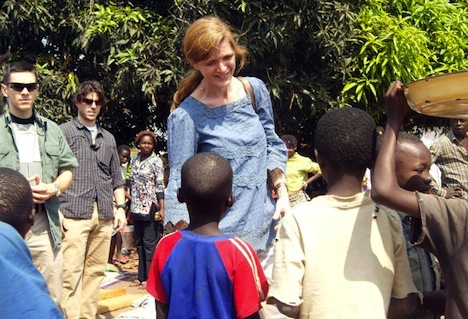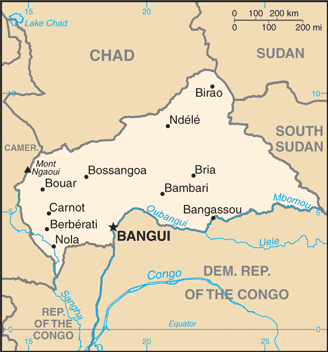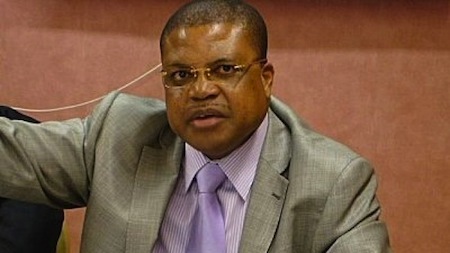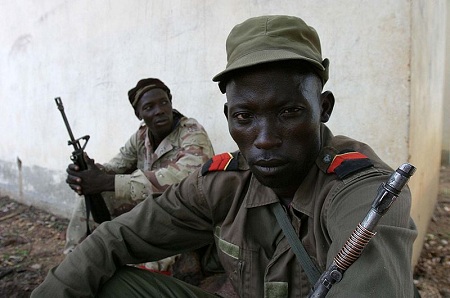With the resignation of the Central African Republic’s president Michel Djotodia over the weekend, the country has its best chance to transcend the violence of the past month — though with grave questions about future Christian-Muslim relations and the CAR’s ability to move forward with any truly secure, representative government.![]()
When French troops arrived in Bangui, the country’s capital, in early December, their mission was immediately more difficult than the French mission earlier in 2013 in Mali to stabilize the interim government and rid northern Mali of foreign forces that controlled much of the northern two-thirds of Mali. Instead, French troops were inserting themselves into an entirely homegrown fiasco — the country’s post-independence record on rule of law, security and democracy is one of the worst (and most tragic) in all of sub-Saharan Africa.
Djotodia, as the leader of the Séléka coalition, pushed François Bozizé out of office in March 2013 — Bozizé himself came to power in 2003 in a putsch of his own, pushing Ange-Félix Patassé out of the centrafricaine presidency and organizing elections to ratify his position in 2005 and again in 2011. Djotodia’s Séléka coalition, which attracted Muslims, but also many Patassé loyalists (Djotodia himself was a former civil servant in the Patassé regime) and a healthy majority of the country’s northern population.
Initially, Djotodia’s selection of Nicolas Tiangaye as prime minister was a strong sign that his new government would actually attempt to unite the country — Tiangaye, a human rights attorney with links to both Bozizé and the Séléka coalition, had a strong record as someone who could unite both rebel and government forces.
But Djotodia, the CAR’s first Muslim president, had a difficult time uniting the country that he spent years dividing, even after his formal inauguration as interim president in August 2013 and after officially disbanding the Séléka coalition in September 2013. Dismantling the Séléka rebels, in fact, may have cost him his sole substantial platform, and it left Djotodia’s forces staggering to fight off the newly formed ‘anti-balaka,’ largely Christian militia that opposed his rule. As a Muslim president and a relatively lesser-known figure throughout the CAR, Djotodia didn’t bring with him any natural base to the presidency, except the Muslim population in the northeastern corner of the country, which amounts to just 10% of the population. Each of the two main centrafricaine ethnic groups, the Banda of the east-central heartland of the country, and the Gbaya in the western third of the country, mistrusted Djotodia from the beginning.
What’s more, Djotodia and Tiangaye soon found themselves at odds over the country’s future, depriving the country of one of its most thoughtful and careful leaders (Tiangaye himself stepped down as prime minister on Friday as well).
Alexandre-Ferdinand Nguendet, previously a member of the National Council for Transition (NCT), will serve as acting president until the NCT selects a new president. Nguendet recognized Djotodia’s presidency shortly after Séléka troops overran Bangui. Nguendet was quick to call an end to the anarchy, imploring an end to fighting between Muslim and Christian groups, and it’s a strategy that just might work — French and African Union troops have worked for the past two months to keep the violence as minimal as possible. That hasn’t stopped over 1,000 deaths in December alone and the internal displacement of nearly 500,000 people, but it has prevented the kind of genocide or massacre that the international community worries might otherwise have resulted. The anti-balaka rebels listed Djotodia’s resignation among their chief demands, so there’s a solid chance that the CAR can retreat from the worst of last month’s fighting.
Samantha Power, the US ambassador to the United Nations, and a proponent of liberal interventionism on humanitarian grounds, even made a trip to the Central African Republic on December 19 (pictured above), demonstrating how seriously the US government is taking the crisis. Though the United States has ruled out sending troops to central Africa, they have pledged to assist the 1,600-strong French military force already there. Notwithstanding Power’s humanitarian concerns, the United States has cause to worry that a militant Muslim minority could transform an anarchic CAR into a staging ground for terrorism — and to foment unrest throughout central Africa, west Africa and the Sahel. Continue reading Does Djotodia’s resignation matter in Central African Republic?



